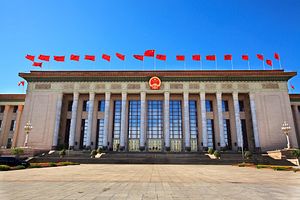Like it or not, President Xi Jinping’s anti-corruption campaign is extremely popular among Chinese people. According to an online survey, “combating corruption” trails “income distribution” as the top two concerns of the Chinese public. There are already reports suggesting that the campaign has helped reduce the transaction cost for ordinary people to get things done in China.
But from the perspective of the more than eleven million government officials in China, this also means reduced opportunities to access “grey income” (i.e., bribes), which accounts for 12 percent of China’s GDP. Consequently, civil servant jobs are increasingly losing their attractiveness in China. According to a recruitment website, more than ten thousand civil servants had quit their jobs in the three weeks following the Spring Festival in Feburary. The exodus of civil servants poses particular challenges for the operation of the judicial system. Already burdened by heavy caseloads, high risks, and government interference, judges are leaving in droves. As aura of appeal for civil service fades, China faces growing pains in policy making and implementation.
But this is only part of the story. The campaign has also changed the rules of the game in China’s officialdom. Corruption in China is so rampant that it involves almost every government official. According to a conservative estimate made by a law professor of Renmin University, China has at least two million corrupt officials not being investigated, but just investigating and convicting them would take forty to fifty years. Instead of setting limited objectives, the new leadership under President Xi has indicated that it will not set any endpoint for the campaign or give pardon or amnesty to corrupt officials. It also vows to pursue each corruption case to the very bottom (yi cha dao di). Those who are found guilty would lose big, including their political life. This in effect creates a zero-sum, one-shot game where winner takes all, and losers (i.e., Bo Xilai) have little chance of replaying the power game and becoming tomorrow’s winners. This has significantly raised the stakes in the game, making players on each side feel insecure. This is evidenced by the rapid increase in the number of officials who have committed suicide since November 2012, when President Xi came to power. In March 2015, President Xi reshuffled the Central Security Bureau that is in charge of his personal safety.
The changing rules of the game, coupled with the sustained political hierarchy in China and rapid centralization of the power of President Xi, make it more likely to reproduce the bandwagoning politics found in the Mao era, when policy actors rushed to jump on the bandwagon of the perceived winner (i.e., Mao) in order to demonstrate their early and enthusiastic support of his favorite policy. While the successful amassing of power should increase the credibility of President Xi’s promises and punishments in the policy process, there is no guarantee that he is the ultimate winner in the anti-corruption campaign. China’s anti-corruption czar Wang Qishan allegedly said recently that the fight against corruption was a stalemate, with each side pitted against each other. Equally important, as a result of more than three decades of post-Mao reform and social change, the political hierarchy has been sufficiently decentralized so that central authority is limited by subnational authorities. This is especially the case if the central leadership fails to spell out its priorities clearly and consistently.
These developments have profound implications for the public policy process in China. As fighting corruption becomes a top priority in China, other important agenda items such as tackling the environmental crisis and deepening healthcare reform might end up on the back burner. Lower-level government officials, being wary about their personal security in the campaign, would officially bandwagon with Xi, or at least pay lip service to his preferred policy agenda. But in reality, they would balk at making any moves that would be interpreted by their colleagues as ambitious attempts to seek personal advantages or threaten the latter’s vested interests. As a result, “not taking phone calls and not writing instructions on documents” becomes the new normal in the policy process. In May 2014, Premier Li Keqiang at a State Council executive meeting assailed this phenomenon of “holding an office and enjoying all the privileges without doing a stroke of work.” The problem of government inaction and policy gridlock is particularly serious at the grassroots level. According to the party secretary of Shanxi Province, in 2014 there was a 60 percent increase in the amount of petitions and offense reports targeting officials at the township level, but the filed charges actually dropped over the same period; during 2013-2014, 20 percent of the townships failed to investigate any corruption cases. In order to address this policy paralysis, the central leadership should seriously consider limiting the objectives of the anti-corruption campaign and incorporating it into the track of rule of law.
Yanzhong Huang is Senior Fellow for Global Health at the Council on Foreign Relations. This post appears courtesy of CFR.org and Forbes Asia.

































